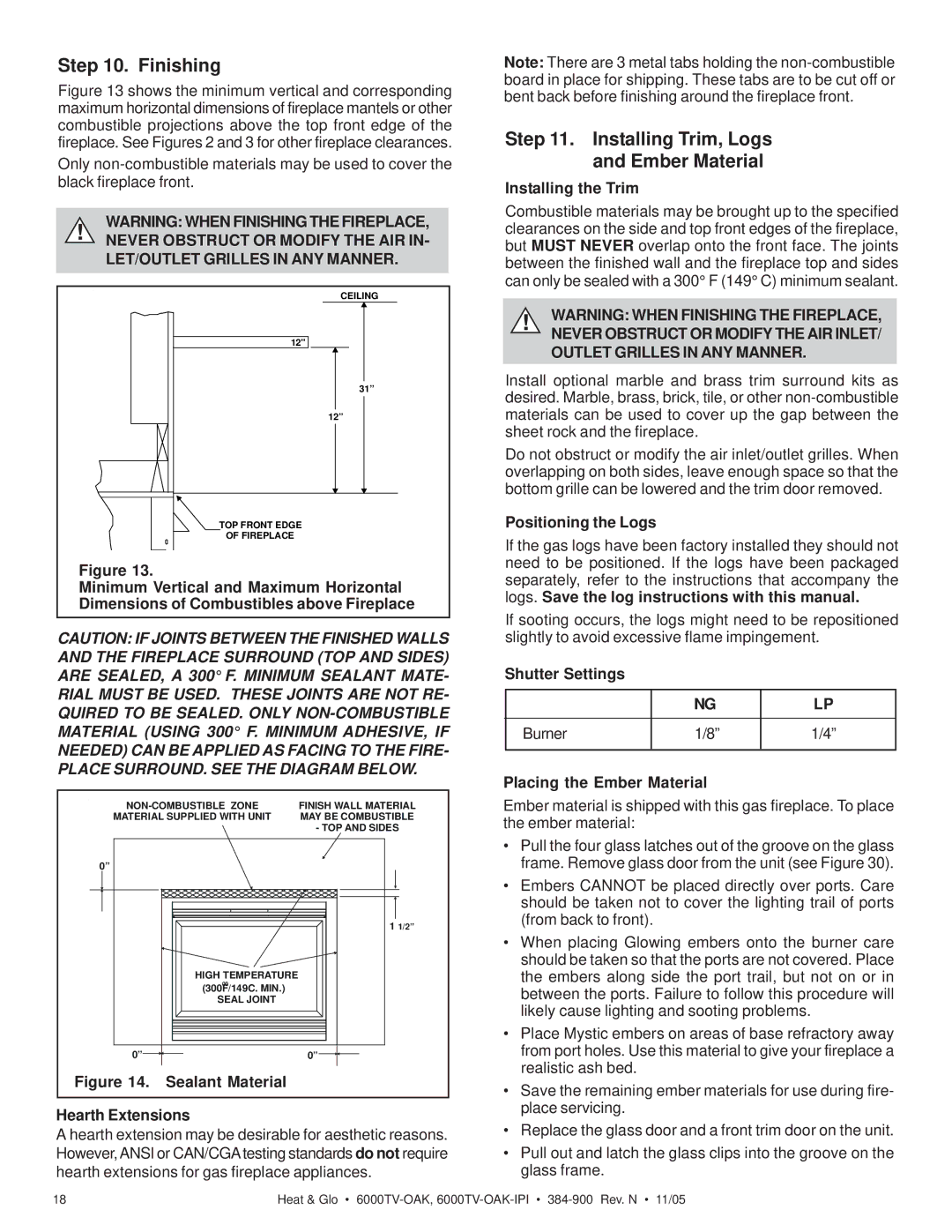
Step 10. Finishing
Figure 13 shows the minimum vertical and corresponding maximum horizontal dimensions of fireplace mantels or other combustible projections above the top front edge of the fireplace. See Figures 2 and 3 for other fireplace clearances.
Only
WARNING: WHEN FINISHING THE FIREPLACE,
!NEVER OBSTRUCT OR MODIFY THE AIR IN- LET/OUTLET GRILLES IN ANY MANNER.
CEILING
12"
31”
12”
TOP FRONT EDGE
OF FIREPLACE
Figure 13.
Minimum Vertical and Maximum Horizontal Dimensions of Combustibles above Fireplace
CAUTION: IF JOINTS BETWEEN THE FINISHED WALLS AND THE FIREPLACE SURROUND (TOP AND SIDES) ARE SEALED, A 300° F. MINIMUM SEALANT MATE-
RIAL MUST BE USED. THESE JOINTS ARE NOT RE- QUIRED TO BE SEALED. ONLY
| FINISH WALL MATERIAL | |
MATERIAL SUPPLIED WITH UNIT | MAY BE COMBUSTIBLE | |
|
| - TOP AND SIDES |
0” |
|
|
|
| 1 1/2” |
| HIGH TEMPERATURE |
|
| 00 |
|
| (300F/149C. MIN.) |
|
| SEAL JOINT |
|
0” |
| 0” |
Figure 14. | Sealant Material |
|
Hearth Extensions
A hearth extension may be desirable for aesthetic reasons. However,ANSI or CAN/CGAtesting standards do not require hearth extensions for gas fireplace appliances.
Note: There are 3 metal tabs holding the
Step 11. Installing Trim, Logs and Ember Material
Installing the Trim
Combustible materials may be brought up to the specified clearances on the side and top front edges of the fireplace, but MUST NEVER overlap onto the front face. The joints between the finished wall and the fireplace top and sides can only be sealed with a 300° F (149° C) minimum sealant.
!WARNING: WHEN FINISHING THE FIREPLACE, NEVER OBSTRUCT OR MODIFY THE AIR INLET/ OUTLET GRILLES IN ANY MANNER.
Install optional marble and brass trim surround kits as desired. Marble, brass, brick, tile, or other
Do not obstruct or modify the air inlet/outlet grilles. When overlapping on both sides, leave enough space so that the bottom grille can be lowered and the trim door removed.
Positioning the Logs
If the gas logs have been factory installed they should not need to be positioned. If the logs have been packaged separately, refer to the instructions that accompany the logs. Save the log instructions with this manual.
If sooting occurs, the logs might need to be repositioned slightly to avoid excessive flame impingement.
Shutter Settings
| NG | LP |
___________________________________________ | ||
Burner | 1/8” | 1/4” |
|
|
|
Placing the Ember Material
Ember material is shipped with this gas fireplace. To place the ember material:
•Pull the four glass latches out of the groove on the glass frame. Remove glass door from the unit (see Figure 30).
•Embers CANNOT be placed directly over ports. Care should be taken not to cover the lighting trail of ports (from back to front).
•When placing Glowing embers onto the burner care should be taken so that the ports are not covered. Place the embers along side the port trail, but not on or in between the ports. Failure to follow this procedure will likely cause lighting and sooting problems.
•Place Mystic embers on areas of base refractory away from port holes. Use this material to give your fireplace a realistic ash bed.
•Save the remaining ember materials for use during fire- place servicing.
•Replace the glass door and a front trim door on the unit.
•Pull out and latch the glass clips into the groove on the glass frame.
18 | Heat & Glo • |
